
What Is Equity Mutual Funds? Equity mutual funds are a favored financial choice for individuals looking to participate in the stock market without directly buying individual stocks. They offer an opportunity to invest in a diversified portfolio of stocks managed by professional fund managers. However, for those new to investing, understanding what is equity mutual funds are and how they work can be a bit challenging. In this blog, we’ll delve into the fundamentals of equity mutual funds, explaining their definition, purpose, types, benefits, risks, and considerations for potential investors. Overall What Are Equity Mutual Funds? Equity mutual funds are a top choice for those who want to invest in stocks without buying them directly
Table of Contents
ToggleWhat Is Equity Mutual Funds?
Equity mutual funds are investment funds that pool money from multiple investors to invest primarily in stocks or equities. These funds are professionally managed by fund managers who make decisions on behalf of investors regarding which stocks to buy, sell, or hold within the fund’s portfolio. The primary objective of equity mutual funds is to generate capital appreciation for investors over the long term by investing in a diversified portfolio of stocks across various sectors and industries. Overall, knowing what equity mutual funds entail can empower investors to make informed decisions and pursue their financial goals with confidence
Types of Equity Mutual Funds
What are the Types of Equity Mutual Funds? Equity mutual funds come in various types, each tailored to specific investment objectives and risk profiles.:
-
- Large-Cap Equity Funds: These funds primarily invest in stocks of large, well-established companies with a proven track record of stable earnings and market leadership.
- Mid-Cap Equity Funds: These funds invest in stocks of mid-sized companies that have the potential for high growth but may also carry higher risk compared to large-cap stocks.
- Small-Cap Equity Funds: These funds focus on investing in stocks of small-sized companies with the potential for rapid growth but also higher volatility.
- Sectoral or Thematic Equity Funds: These funds specialize in investing in stocks of companies operating within a specific sector or theme, such as technology, healthcare, or energy.
- Balanced or Hybrid Equity Funds: These funds maintain a mix of equity and debt securities to provide investors with a balanced exposure to both asset classes
Benefits of Investing in Equity Mutual Funds
Investing in equity mutual funds offers several potential benefits for investors:
-
- Diversification: Equity mutual funds provide investors with exposure to a diversified portfolio of stocks, reducing the impact of individual stock volatility on overall portfolio performance.
- Professional Management: Fund managers conduct in-depth research and analysis to identify investment opportunities and make informed decisions on behalf of investors.
- Liquidity: Investors can easily buy or sell units of equity mutual funds on any business day at the prevailing Net Asset Value (NAV), providing liquidity and flexibility.
- Potential for Higher Returns: Over the long term, equity mutual funds have the potential to generate higher returns compared to traditional fixed-income investments like bonds or savings accounts.
Risks Associated with Equity Mutual Funds

While equity mutual funds offer the potential for higher returns, they also come with certain risks that investors should be aware of:
-
- Market Risk: Equity markets are subject to volatility, and fluctuations in stock prices can affect the value of mutual fund investments.
- Sectoral Risks: Sector-specific mutual funds are exposed to risks associated with the performance of particular industries or sectors of the economy.
- Managerial Risk: The performance of equity mutual funds depends on the skill and expertise of the fund manager, and poor investment decisions or changes in management can impact returns.
- Liquidity Risk: In times of market stress or economic downturns, investors may face challenges in selling their mutual fund units at desired prices due to reduced liquidity in the market.
Considerations for Potential Investors
Before investing in equity mutual funds, investors should consider the following factors:
-
- Investment Goals: Clearly define your investment objectives, risk tolerance, and time horizon before selecting a mutual fund that aligns with your financial goals.
- Fund Performance: Evaluate the historical performance of mutual funds, including returns, volatility, and consistency, to assess their track record.
- Fees and Expenses: Understand the fees and expenses associated with mutual fund investments, including management fees, administrative expenses, and sales charges.
- Fund Manager Expertise: Research the credentials and experience of the fund manager to assess their ability to achieve the fund’s investment objectives.
Conclusion
Equity mutual funds offer investors a convenient and accessible way to participate in the potential growth of the stock market while diversifying risk and benefiting from professional management. By understanding the basics of What Is Equity Mutual Funds, evaluating their benefits and risks, and considering key factors before investing, individuals can make informed decisions to achieve their financial goals and objectives. Remember to consult with a qualified financial advisor or investment professional to tailor your investment strategy to your specific needs and circumstances. Happy investing!
FAQs (Frequently Asked Questions)
Are equity mutual funds taxable?
For taxation purposes, an equity mutual fund is considered an equity scheme if it has a 65 percent or greater exposure to the equity of companies. There is an exit load of 1% on the market value of the investments to be redeemed if you redeem your equity mutual fund investments within a year.
Are equity mutual funds a good investment in India?
Equity mutual funds are one of the many types of mutual funds available in India, and they often offer comparatively greater returns. The overall state of the economy and changes in the market can have an impact on the returns. Investing in equity funds requires careful selection if you want to get returns that meet your objectives.
(Disclaimer: The above article is meant for informational purposes only, and should not be considered as any investment advice. niveshdarpan.in suggests its readers/audience to consult their financial advisors before making any money related decisions.)





6 thoughts on “What Is Equity Mutual Funds”